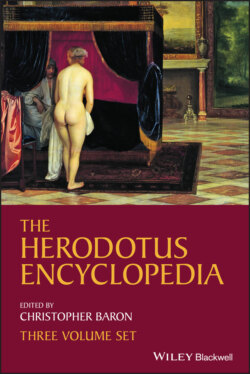Читать книгу The Herodotus Encyclopedia - Группа авторов - Страница 121
AEGEIDAE (Αἰγεῖδαι, οἱ)
ОглавлениеKATHARINA WESSELMANN
Christian‐Albrechts‐University, Kiel
The Aegeidae are descendants of Aegeus, grandson of THERAS through OEOLYCUS, whose lineage traces back to POLYNEICES and CADMUS SON OF AGENOR. Herodotus describes the Aegeidae as “a big clan (megalē phylē) in Sparta” (4.149.1). There is no information in the Histories on how the mythical Theban FAMILY came to live in SPARTA, but Herodotus tells the anecdote that the family could not at first produce CHILDREN who survived to adulthood; only when they set up a temple for the avenging spirits (erinyes) of LAÏUS and OEDIPUS—apparently a RITUAL to purify the family after the horrific deeds of their ancestors—did their offspring start to flourish (4.149.2). The same legend is elsewhere cause for their EXILE: according to Pausanias, AUTESION, father of Theras, left THEBES for the PELOPONNESE because he was chased by the FURIES of Laïus and Oedipus (9.5.15). An Isthmian ode of PINDAR (Isthm. 7) and its scholia indicate that the Spartans recruited the Aegeidae in their war against Amyclae.
Herodotus tells us no more about the clan, but they must have been fairly well known to his AUDIENCE, seeing that they were linked with the royal family in Sparta through Theras, brother of the widowed queen ARGEIA and warden of her young sons and therefore, temporarily, ruler of Sparta (Hdt. 4.147). The family’s prominent status is also attested elsewhere, for example in Pausanias, who claims that Aegeus’ descendant Euryleon shared command in the first Messenian War with the two Spartan kings (4.7.8), and that Cadmus, Oeolycus, and Aegeus had shrines in Sparta (3.15.8). The Aegeidae appear several times in Pindar: they are supposed to have brought the cult of APOLLO Carneius to THERA, a colony founded by Theras (Hdt. 4.147–48), from where their descendants moved on to CYRENE (Pind. Pyth. 5.72–81) and, via various other places, to ACRAGAS in SICILY (schol. Pind. Ol. 2.16, 2.82).
SEE ALSO: Colonization; Myth; Pollution
